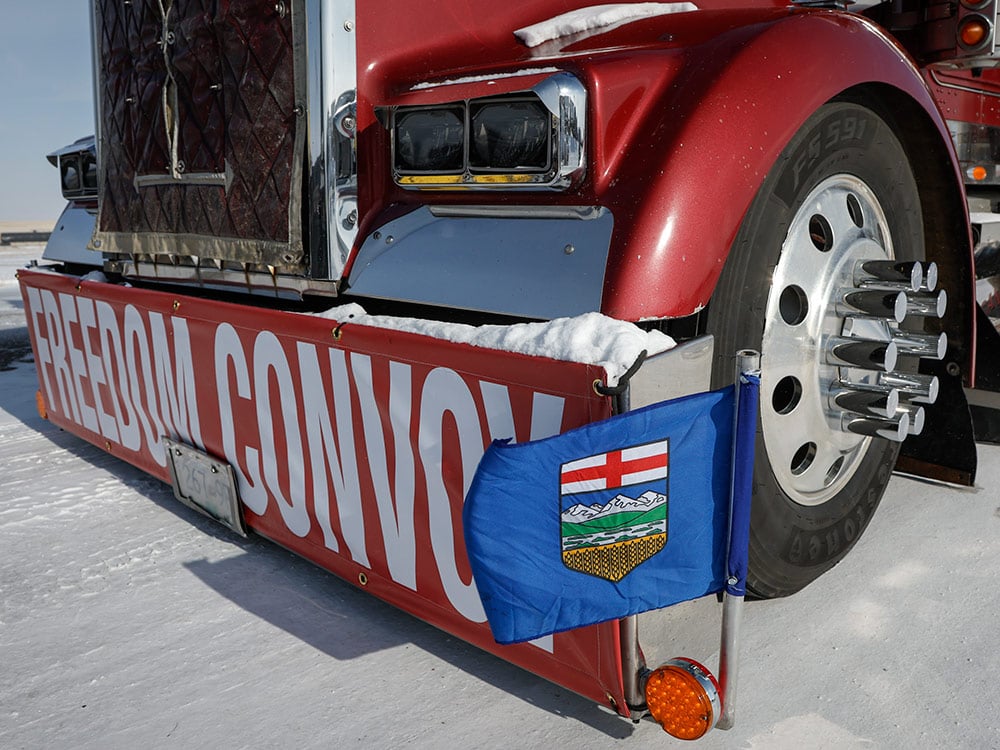The Canadian government has invoked the Emergencies Act. Do you know where your trucks are? If you don’t, and you run a trucking company, you might want to check.
As Deputy Prime Minister Chrystia Freeland said yesterday, “If your truck is being used in these illegal blockades, your corporate accounts will be frozen. The insurance on your vehicle will be suspended.”
That seems clear enough.
Prime Minister Justin Trudeau called the news conference at which Freeland spoke yesterday to announce the imposition of a public order emergency under the Emergencies Act.
Trudeau vowed the emergency will be used to end the blockades on the Canadian border and the occupation of Ottawa by participants in the so-called “Freedom Convoy” that was foolishly allowed to roll into town on Jan. 29 by an inattentive Ottawa Police Service.
Most Canadians will heave a sigh of relief, even if Canada’s Conservatives try to spin this as an outrage against freedom without sounding too much like they’ve crawled into bed with a mob of people bent on wrecking the economy and holding citizens of the nation’s capital hostage in support of a large number of ill-defined and fundamentally anti-democratic goals, including overthrowing a recently elected government.
Newspaper editors itching to publish headlines saying “Like Father, Like Son,” as commentator Nora Loreto suggested they probably would, were disappointed.
This was no just-watch-me moment like Pierre Trudeau, barely suppressing his fury during the October Crisis of 1970. Indeed, it was a pretty restrained performance in most regards.
Justin Trudeau said the measures adopted under the act — which was passed in 1988 by Brian Mulroney’s Conservative government to replace the War Measures Act employed by the prime minister’s father during the terrorist kidnapping crisis that roiled Quebec in 1970 — were confined to locations where disruptions are taking place and “reasonable and proportionate to the threats they are meant to address.”
Naturally, there will now be a great deal of criticism that Trudeau has overstepped his bounds, and plenty of more thoughtful analysis later. By and large, though, while the latitude granted by the law is great, the measures adopted seem commensurate with the crisis.
Conservative leaders who demanded a harsh response to the rail blockades in February 2020, claiming they threatened the national economy, seem to have been blithely unconcerned by the potentially far more serious economic impacts of the blockades of February 2022 — at least until they realized being seen serving coffee to a mob of lawless goons with sinister foreign connections squatting on Parliament Hill was not a good look.
Since foreign and domestic funds for the convoy disruption came via crowdfunding platforms and used cryptocurrencies to evade measures to track spending on criminal activities, Freeland’s announcement of the emergency extension of those rules is likely to seem logical to most Canadians too.
“The illegal blockades have highlighted the fact that crowdfunding platforms, and some of the payment service providers they use, are not fully captured under the Proceeds of Crime and Terrorist Financing Act,” she said. “We know that these platforms are being used to support illegal blockades and illegal activity which is damaging the Canadian economy.”
This will also present an interesting conundrum for the federal Conservatives and their United Conservative Party brethren in Alberta, since both parties have lately touted the dubious benefits of cryptocurrencies, which seem primarily to exist to facilitate crime, create dark political money and avoid paying taxes.
The government promised it would make the new regulations permanent by passing legislation when the state of emergency is lifted. In a news conference on an unrelated topic yesterday, a seemingly rattled Alberta Premier Jason Kenney, just off his conference call about implementation of the Emergencies Act with the PM and other premiers, complained that “we don’t believe this is necessary in Alberta, we think it could actually be somewhat counterproductive.”
Having done nothing for more than two weeks while the Coutts blockade cost Albertans millions every day, he must know that the revelation the blockade was harbouring a cadre of heavily armed men primed for a potentially deadly shootout with police makes him look derelict and irresponsible.
RCMP arrested 13 people and seized an arsenal of high-powered weapons and ammunition at the Coutts blockade on Sunday night.
If Trudeau’s gamble that using the Emergencies Act will be enough to send the far-right insurrectionists home to think again, Kenney may realize that even if his truckling to the blockaders gets him past his April 9 party leadership review, it may not go down well with Alberta voters in his next electoral test, the general election expected in 2023.
And the Emergencies Act seems to be working in Coutts. Reports from the scene last night suggested blockaders were climbing into their rigs and bugging off home as quietly as possible to await their personal visits from the Mounties.
Meanwhile, Kenney is not paying much attention to running Alberta these days.
Yesterday it was revealed that his chief of staff, Pamela Livingston, will take a leave of absence to work full time on the campaign leading up to the April 9 vote.
Out of time to stall, Kenney will now have to announce a date for the byelection in Fort McMurray-Lac La Biche, in which former Wildrose Party leader Brian Jean has been nominated as the UCP candidate on a platform of unseating and replacing the premier. (The premier blamed the Omicron variant of the COVID-19 virus for the delay at his second news conference yesterday.)
Presumably this means we can expect more erratic nonsense like Kenney’s irresponsible diversionary effort yesterday to wind-up anti-vaxers to head to the offices of the Alberta Federation of Labour and protest its support for keeping COVID-19 protections in schools until the fifth wave eases, as well as his bizarre claim Calgary Mayor Jyoti Gondek called him a “potlicker.” (Politicker, surely!) ![]()
Read more: Rights + Justice, Politics
















Tyee Commenting Guidelines
Comments that violate guidelines risk being deleted, and violations may result in a temporary or permanent user ban. Maintain the spirit of good conversation to stay in the discussion.
*Please note The Tyee is not a forum for spreading misinformation about COVID-19, denying its existence or minimizing its risk to public health.
Do:
Do not: